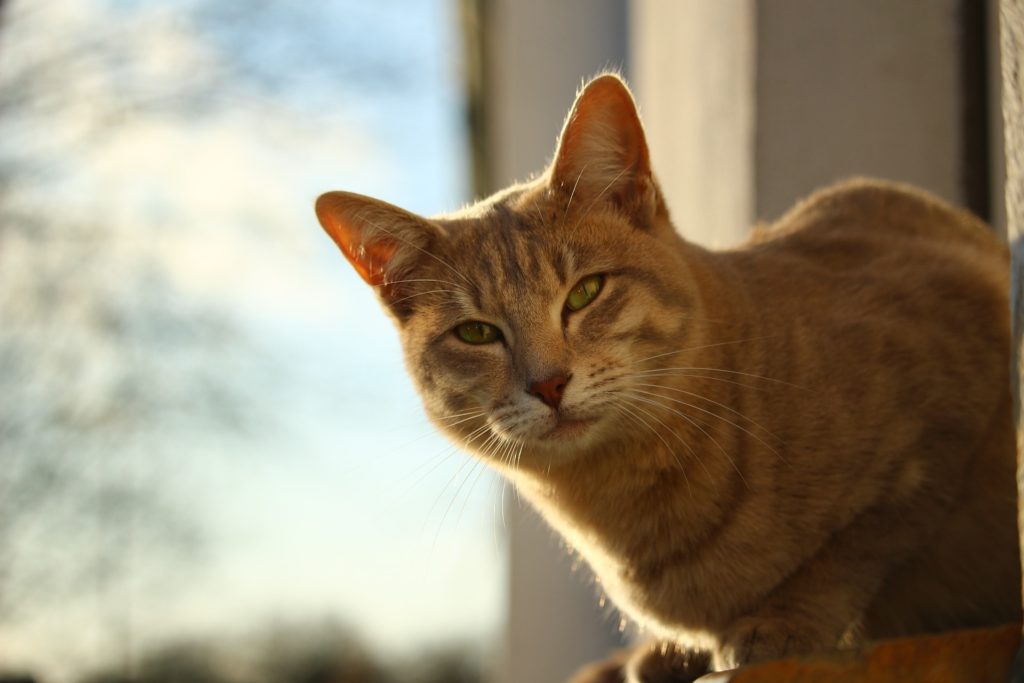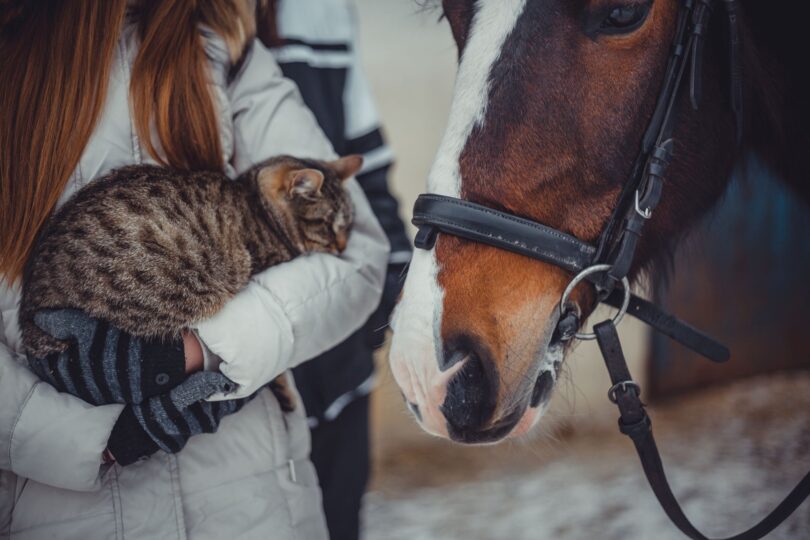Note: This article was originally published on our sister site Love & Let Go.
How to Start Healing
Our relationship with barn kitties can be incredibly strong, almost as strong as those with our horses. No wonder the loss of a farm cat can be heartbreaking. Whether sudden or expected, it feels like losing a close friend or family member.
After all, you relied on and cared for each other. Since cats often live into their teens (even outdoor kitties!), you may have had your pet for a long time. Being without them will be an adjustment, and it’s OK if you struggle to cope.
In this article, we’ll discuss 6 ways to start healing:
- Don’t be Afraid to Talk About It
- Make a Scrapbook or Memory Box
- Commemorate Your Cat
- Dedicate a Plant
- Get Out of the House
- Find a New Purpose
The grief process is different for every pet owner. After the loss of a cat, you will likely go through stages of grief that may last a short time, or months, or even years. It’s completely normal to feel sad, but there are ways to help heal from the loss.
How to Start Moving Forward
Don’t be Afraid to Talk About It
Some pet owners feel silly grieving for a cat. But your barn family and friends should understand that your cat meant a lot to you.
You may prefer talking to other cat lovers online or in person. They can empathize with your loss in ways that other people may not be able to.
There are also online forums for expressing experience with pet loss if you prefer to share in a more anonymous setting. Regardless of your chosen outlet, sharing your feelings and sense of loss will help you accept and move forward.
Make a Scrapbook or Memory Box
Consider making a scrapbook using printed pictures of your cat’s life with you.
Or, create a memory box that includes photos and items that remind you of your cat (e.g. favorite toy, collar).
You may want to include anecdotes of funny things your cat used to do. Write down some memories, such as how you got the cat and what its personality was like. When you look back at these memories, you will eventually smile and focus on all the wonderful moments you shared.
Commemorate Your Cat
Doing something special in remembrance of your cat is a great way to turn the grief into a celebration of life.
For example, you could make a donation to (or volunteer at) your local animal shelter in honor of your cat.
Or, if you prefer having a physical reminder in your home, consider purchasing a commemorative urn, ornament or garden stone.

Gone does not mean forgotten (Source: Pixabay)
Dedicate a Plant
These curious animals are lovers of nature, and those that explored the great outdoors can be honored in a natural way.
Consider planting catnip, cattails, or a special tree in your cat’s memory.
Every time you look out your window or walk to the barn, you’ll remember your pet in a beautiful way. Think about purchasing a garden stone with the cat’s name and/or photo engraved on it to place under the plant.
Get Out of the House
A cat’s death will affect your daily routine—in big and small ways.
This may lead to feelings of loneliness. In fact, you might feel like curling up in a ball and hiding under the covers all day, every day. Or, you might find yourself walking the barn aisle, glancing at the places your cat usually hung out.
While it might be the last thing you feel like doing, make plans to get out and about and do something that you would normally enjoy.
It might be a social event with your friends, taking in a horse show, reading on your porch swing, or going for a ride. It is important to remind yourself that life is still happening around you, even while you are grieving.
Find a New Purpose
When you’re ready, try to find a new sense purpose. Perhaps you were spending hours each day caring for a sick cat. Maybe you had nursed a rescue kitten back to health years ago, and every time you looked at her all grown up, it had filled you with a sense of accomplishment and joy.
You can feel a sense of purpose in your life again—but you may have to intentionally seek it out.
This may mean sharing more time and love with existing people and animals in your life. Or, it may mean rediscovering a hobby you used to enjoy. Or, perhaps, it’s time for a new foster pet, activity, or friendship.
Being purposeful about how you reallocate the time you would have spent with the cat will help you move past your grief and find new meaning and hope.
Frequently Asked Questions
How do you handle losing a cat suddenly?
You might have feelings of guilt if your cat dies suddenly. Questions such as “How did I not notice my cat was sick?’ or ‘Why didn’t I take my cat to the vet sooner?’ might be swirling around your head.
You might even second guess choices that you made regarding your cat’s care and final moments.
Try to refocus your thoughts on the wonderful life you gave your cat. You are not to blame for the cat’s passing.
Do cats miss each other when one dies?
It is not just the humans that can miss a cat–other animals in the house may show signs of grief as well.
For example, loss of appetite, seeking more attention, and looking for the cat that has passed away are signs that remaining pets might be grieving.
In a 2016 study, cats showed behavioral changes when losing an animal companion. Pet owners also reported more affectionate and clingy behavior, as well as seeing other pets seek out the deceased animal’s favorite hangout spots.
Cats were even reported to increase the frequency and volume of their vocalizations after the passing of a companion.
What are some symptoms of a dying cat?
A cat who is nearing the end of life will start often to exhibit certain behaviors. Your cat may become lethargic and sleep more often than normal. Many cats seek also solitude when they are nearing the end.
Don’t be surprised if your cat refuses food and water in the final days.
What You’re Feeling is Normal
Grieving a pet is a gradual process and unique for every pet owner, but you won’t feel this way forever.
By expressing your sadness in healthy ways, you’ll be able to refocus your memories on happier times from your cat’s past– and hopeful plans for your future.
P.S. If you found this article helpful, check out:
- Canine Empathy: Can Barn Dogs Sense Sadness?
- Fact vs. fiction: Is it illegal to bury a barn cat in your yard?
- 5 Signs It May Be Time to Bid Your Farm Dog Farewell
- My barn dog isn’t eating. Should I be worried?
- Navigating the 5 stages of grief after losing a horse
- Preparing for Peace: What it Means to Euthanize a Barn Dog
Further Reading
Jessica K. Walker, Natalie K. Waran and Clive J. C. Phillips (2016). Owners’ perceptions of their animal’s behavioural response to the loss of an animal companion. Animals, 6, 68; doi:10.3390/ani6110068







